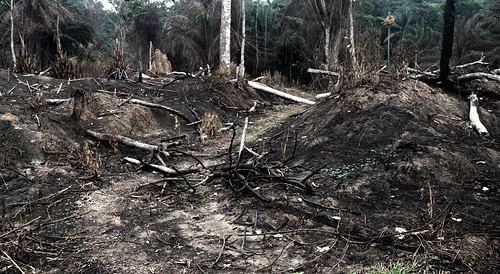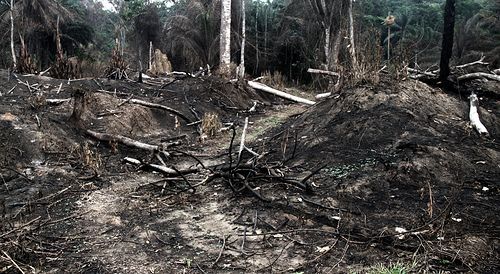 Deforestation causes more carbon pollution than all the cars, trucks, ships, and planes in the world combined.Photo: Helen LloydThis post was originally published on The Energy Blog, a project of Planet Forward and the National Geographic’s Great Energy Challenge.
Deforestation causes more carbon pollution than all the cars, trucks, ships, and planes in the world combined.Photo: Helen LloydThis post was originally published on The Energy Blog, a project of Planet Forward and the National Geographic’s Great Energy Challenge.
The Cancun climate summit may be turning into a surprising opportunity for progress towards saving the world’s forests and other ecosystems, or Reducing Emissions from Deforestation and Degradation (REDD+) in the wonky parlance of the climate negotiations.
Even as a comprehensive agreement faces challenges, there’s relative consensus that the parties to the Kyoto Protocol, the predecessor climate agreement to the one being negotiated in Cancun, made a huge mistake when they refused to allow countries and companies to receive carbon credit for investing in conservation of forests and other carbon-rich ecosystems. Without these financial incentives to protect them, these forests are worth more dead than alive to landowners, companies, and even governments. As a result, they’ve been going up in smoke to make room for cattle ranches, palm oil plantations, illegal logging operations, and soybean fields. The Earth has lost more than 300 million acres of forest in the last 15 years. That deforestation causes more carbon pollution than all the cars, trucks, ships, and planes in the world combined.
If successful, the Cancun negotiations could mark a giant step towards fixing that calamitous error — and drastically reducing deforestation on the ground. Despite significant obstacles standing in the way of an overall, comprehensive agreement, negotiators have nearly hammered out the rules of the road for crediting forest conservation on topics ranging from satellite monitoring of conservation projects to protection for indigenous people and biodiversity.
Just having those rules in place could unleash unprecedented billions of dollars in annual investments for forest conservation: Unlike the United States, the European Union attaches great weight to the proceedings of these international climate conferences — and has been waiting for a permission slip from the Cancun process before allowing tropical forest conservation to be credited within its existing Europe-wide emissions reduction system.
But if the Europeans get the international imprimatur they apparently crave, it could create an even broader breakthrough: E.U. countries are currently engaged in a heated debate about whether to pursue a 20 or 30 percent target for emissions reductions by the end of the decade. The sudden legal availability of a low-cost emissions reduction option like tropical forest conservation would make that decision enormously easier. Europe could suddenly meet the 30 percent target for about the same price as it would cost to meet the lower target without tropical forest conservation credits. That’s good news for the climate overall and would likely smooth the way for other countries — such as Japan, China, and India — that are more willing to adopt more ambitious climate targets themselves.
That’s the rosy scenario. But, as two decades of U.N. climate negotiations have shown, it’s perilous to depend on these consensus-based U.N. negotiations to reach comprehensive agreement. And, true to form, a small bloc of hard-left Latin American nations led by Venezuela, Cuba, Bolivia, and Nicaragua are threatening to oppose any use of market mechanisms to save forests, or address climate change in general.
Developed countries “don’t want to lower the temperature, they want to convert the forest into a product, so I feel they want to threaten humanity’s survival, they want to end all life, and this will cause a global reaction,” Bolivian President Evo Morales said.
This kind of rhetoric and the stance it represents puts the entire European Union — and the world’s highly imperiled tropical forests — in the slightly ridiculous position of giving Hugo Chavez, Fidel Castro, Evo Morales, and a few others veto power over climate policy for the whole world. At some point, their continued intransigence may test even the patience of the Europeans.
As nice as it would be to do so, we can’t just put the blame on internationalist Europeans and hostile socialists — if progress on forests at Cancun is blocked, the Obama administration may share a significant portion of the responsibility. Even though President Obama has publicly and privately endorsed the inclusion of tropical forests in any plan to fight climate change, his administration is threatening to sacrifice progress on forests (and other issues) for an overall all-or-nothing negotiating posture.
In short, the administration is telling the world that unless the negotiators reach what it calls a “balanced” comprehensive accord including all key climate issues, it will block movement on any component issues such as forests or financing for climate adaptation. In theory, this strategy could pay broad dividends to move the world toward a broader breakthrough, but it’s risky.
Having said that, it remains to be seen if the United States would actually go to the mat to obstruct rainforest conservation, especially given the strong, bipartisan political support for tropical rainforest protection in the United States (one of the few areas of climate policy on which bipartisan consensus exist).
It’s also possible the U.S. posture could become moot if it does manage to achieve a breakthrough on a broad set of issues — a tantalizing possibility this week as the United States and China signaled they were close to agreement on the key, politically charged issue of emissions monitoring and transparency (the administration wants to reassure politicians in the United States that China actually achieves any emissions reductions to which it commits).
“We have no problem with MRV [Measuring, Reporting, and Verification],” Su Wei, China’s chief negotiator was quoted saying.
We’ve “spent a lot of energy in the past month working on those issues where we disagree and trying to resolve them,” said U.S. negotiator Jonathan Pershing. “My sense is we have made progress.”
Things may become clearer at a high-level forest extravaganza being organized by Avoided Deforestation Partners (my former employer and current client) next Wednesday, Dec. 8, right before the high-stakes conclusion of the summit. At the event, several world leaders, including U.N. Secretary-General Ban Ki-moon, Norwegian Prime Minister Jens Stoltenberg, Guyana President Bharrat Jagdeo, George Soros, Walmart chairman Rob Walton, and Pershing will discuss how to move forward to protect forests. Last year, a similar Avoided Deforestation Partners event in Copenhagen was the venue for U.S
. Agriculture Secretary Tom Vilsack to announce a surprising one billion dollar commitment to tropical forests, one of the key achievements of the Copenhagen summit.
Let’s hope this year’s event, or some other venue, is the site of a similar, or greater, breakthrough.




